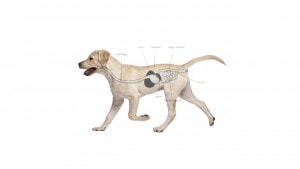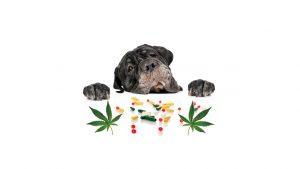Imagine your normally playful golden retriever, struggles to climb the stairs. You notice him whimpering when he tries to get up from his bed. We hate to see our pets in pain or distress. But what if there was a natural way to ease their suffering and restore their energy?
That’s where CBD for dogs comes in. This comprehensive guide dives deep into the world of canine CBD, exploring its potential to transform your dog’s life, from easing anxiety to managing pain and promoting overall dog wellness CBD.
Does your dog turn into a mess during thunderstorms? Does he bark incessantly when you leave the house? These are signs of anxiety, a common problem affecting many dogs. CBD may offer a natural way to soothe their frayed nerves. CBD interacts with receptors in the brain that regulate mood and stress responses, potentially reducing feelings of fear and anxiety.
As dogs age, they often develop joint pain, arthritis, or hip dysplasia, making everyday movements a struggle. It’s hard to watch your once-agile companion become stiff and slow. CBD’s potential anti-inflammatory properties may offer a natural solution. It may help reduce pain and inflammation associated with these conditions, allowing your dog to move more freely and comfortably. Imagine your senior dog, once reluctant to go for walks, now happily trotting alongside you again. That’s the potential power of CBD for pain management. A study published in Pain showed promising results regarding CBD’s impact on inflammation. Compared to traditional pain medications, CBD may offer a more natural approach with fewer side effects, though it’s crucial to consult your vet.
Witnessing your dog experience a seizure is a terrifying experience. While more research is needed, some studies and anecdotal evidence suggest that CBD may help reduce the frequency and severity of seizures in dogs with epilepsy. It’s like a potential stabilizing force for their nervous system. However, it’s crucial to consult with your veterinarian before using CBD for seizures, especially if your dog is already on medication, as interactions are possible.
Navigating the world of CBD products can be overwhelming. Here’s what to look for:
Determining the correct dosage of CBD for your dog depends on factors like weight, size, and the condition being treated. Start low and go slow, gradually increasing the dose until you see the desired effects. Consulting with your veterinarian is crucial, especially if your dog is on other medications.
The legal landscape surrounding CBD is complex and varies by location. In the US, CBD derived from hemp with less than 0.3% THC is federally legal. However, state laws may differ.
Researchers are continuing to explore the potential of CBD for various canine health issues, including cancer, digestive problems, and immune disorders. The future of CBD in veterinary medicine looks promising.
CBD works best when combined with a healthy lifestyle. This includes a balanced diet, regular exercise, mental stimulation, and regular veterinary checkups.

Just as CBD may help humans due to its interaction with the body’s endocannabinoid system, the same is true of dogs. CBD has the potential...
Read More
What Is CBD for Cats? CBD (Cannabidiol) is a natural compound from hemp. It’s non-psychoactive, meaning your cat won’t get “high.” Instead, it works with...
Read More
CBD for Pets: A Pet Parent’s Guide to Dosage We all want the best for our pets, especially when they’re struggling with pain, anxiety, or...
Read More
What is the Endocannabinoid System (ECS) in Cats? Think of the ECS as a vast network of receptors located throughout your cat’s body. These receptors...
Read More
Debunking Common CBD Pet Myths Let’s tackle these myths head-on. It’s time to separate fact from fiction when it comes to CBD for our beloved...
Read More
As with humans, cannabidiol (CBD) oil provides many physical and psychological benefits for canines. In fact, some research suggests that CBD oil may help alleviate...
Read More
If you are looking for ways to help your aging dog, you may have come across CBD oil information and be wondering “What is CBD...
Read More
What Is The Endocannabinoid System in Pets? The endocannabinoid system in humans has gotten increasing attention in recent years, particularly as the internal system has...
Read More